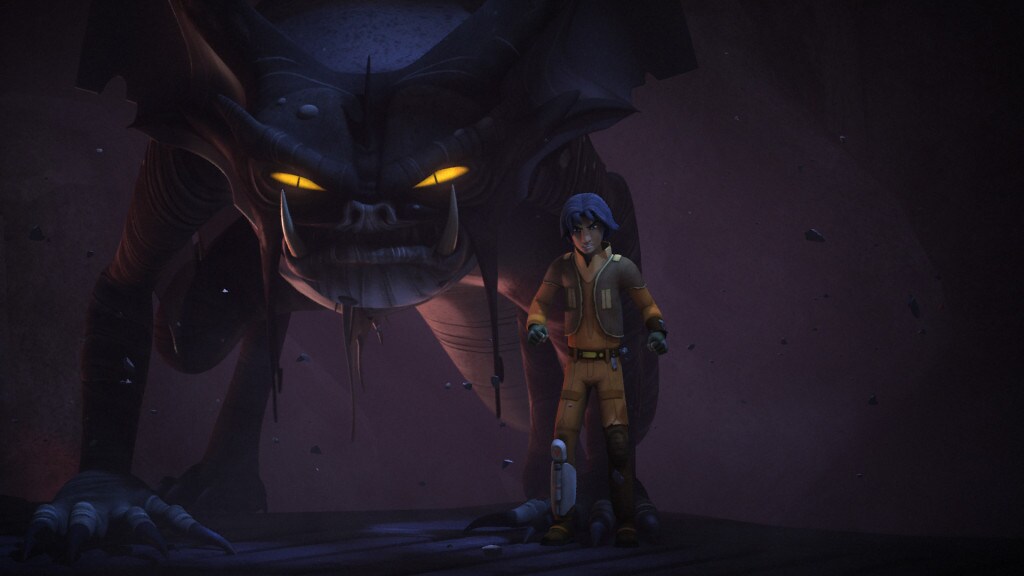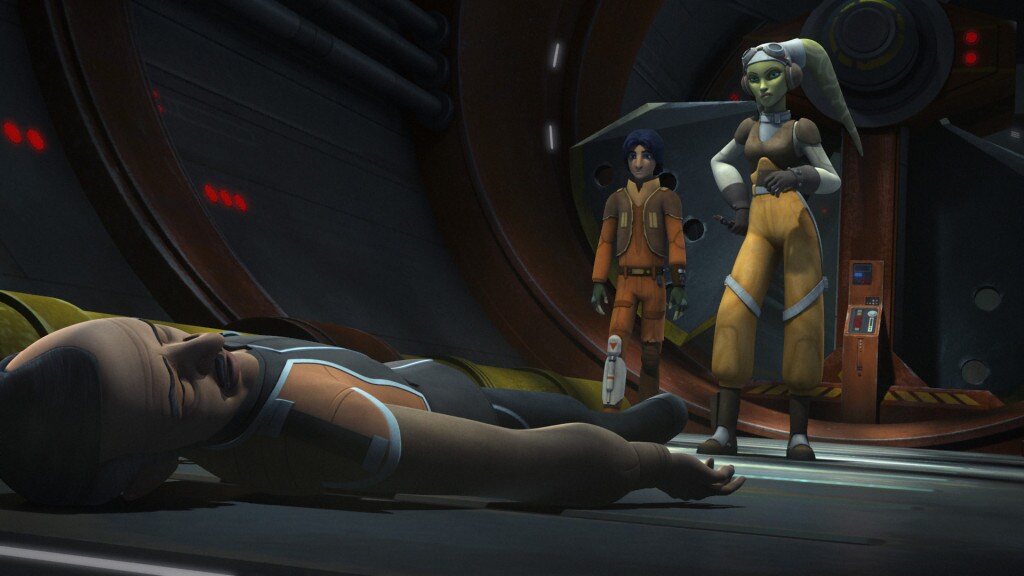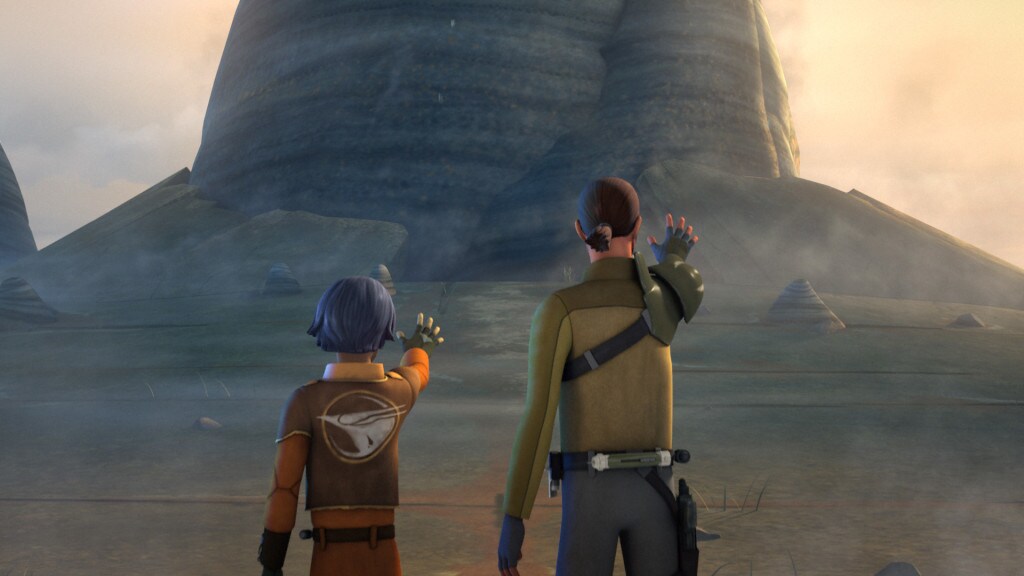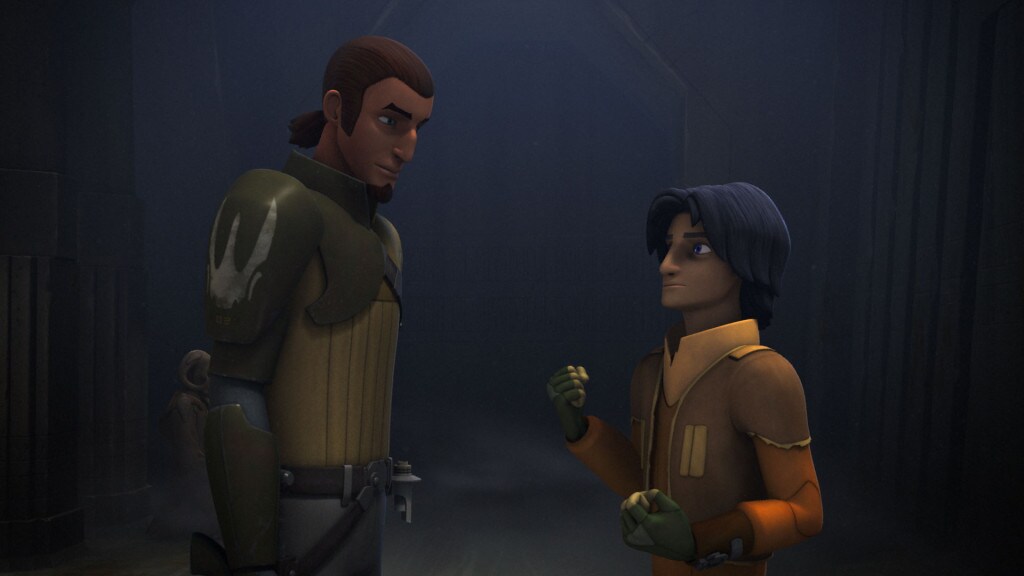The Star Wars Rebels executive producer discusses major moments from Season One!
In part two of StarWars.com's interview with Dave Filoni (in case you missed it, be sure to check out part one), the executive producer and co-creator of Star Wars Rebels addresses some of Season One's biggest story elements (pre-tonight's season finale), including giant fyrnocks, what makes Hera truly strong, and understanding truths from "a certain point of view."
StarWars.com: The show clearly goes for that classic Star Wars tone. In approaching Rebels, which has a very different tone than Clone Wars, did you prepare differently?
Dave Filoni: Not really. I'm a firm believer that characters have to go through trials; otherwise it's just not believable. It's not like Ezra or the rest of the characters have a simple life. We get a little dark. The problem with dark storylines is, and I learned this on Clone Wars, they seem really fun when you pitch them, but the audience actually enjoys it far more when the heroes win. They'll say they don't, but it's not true. It's exhilarating when Luke blows up the Death Star -- you’re excited about it. In Clone Wars, when we would defeat the bad guys, viewers were always more excited than when we'd kill off a favorite clone.
For me, with Rebels, it's very satisfying to see when the characters push through a problem and come out stronger on the other side. That's what makes it feel more like the classic trilogy. Where Clone Wars was always spiraling downward to a defeat, in this you still have hope, and you keep hope alive the whole time. The characters get inspired by one another. The situations they are in allow for banter that's more conducive to being funny. Chopper, especially, can be really bizarre. Like an old-school Muppet droid.
StarWars.com: I'd like to run through various beats from this season, and have you give some insights on how they came to be. To start, what can you tell us about Fort Anaxes and Ezra's conjuring of the giant, mama fyrnock?
Dave Filoni: The fort came about because we had the asset left over from Clone Wars, and we never finished shooting it. It was like having a big backlot set built that was never used. So we just kind of trashed it and used it to shoot Rebels.
We always knew there was going to be a manifestation of this connection to these creatures, and that Ezra was going to summon a bigger creature, a mama version. But I really wanted to push the tension into this almost Akira-like moment, where he seems not himself, and is in a possessed state. It's an important moment which demonstrates his connection to the Living Force. Ezra is open to the idea that life is connected in a way that he doesn't understand yet.
You have to be careful with that connection. What he's doing in that moment is active. He is guiding and directing the Force which in this case comes out of his fear and anger at the Inquisitor. The result is he brings up something that he doesn't have control over. That's why Kanan has the discussion with Ezra afterward and he brings up the dark side. You see where Kanan has maybe made a misstep. Ezra is advancing faster than Kanan would have thought possible because Kanan doesn’t have past experience teaching to compare it to having never become a Jedi Knight himself.
StarWars.com: You see it a little bit in Attack of the Clones, but the show has really introduced this idea of connecting with animals through the Force. Where did that come from?
Dave Filoni: That mainly comes from a belief that it was possible, that I've had ever since I was a kid. And it is in the Geonosis arena. Pablo Hidalgo and I would talk about it in the story meetings, and everybody liked it. We're not saying that Ezra commands and tells these creatures what to do. It's just a connected awareness to other living things that he can influence. Kind of like a mind trick, to some degree. He can call things to action, or he can take the fear of something and manifest it in a creature. It's not just to attack -- it's for calming. It’s for connectivity. It’s for reaching out to the grass, the trees, and the entire world around you. It's a life force that surrounds all living things. He displays an innate ability to do this, unlike anything Kanan's really seen before.
It makes him different than Luke Skywalker, but it's not like that's his super power. The best expression of the Force is not a lightsaber fight or other combat techniques. It’s really about your connection to life, to everything around you, and your ability or willingness to let go, to find peace, and ultimately become a selfless part of existence. Luke Skywalker does not use some special ability to save his father. He trains hard, finds discipline, knowledge, but in the end there is no power that aids him, except the power of compassion and love; the act of forgiveness and apparent self-sacrifice is what saves his father from the dark side. Not a lightsaber fight.
StarWars.com: And how many kids around the world do you think are trying to control their cats now?
Dave Filoni: [Laughs] That's great. I hope they are. As long as they're nice cats, it should work out.
I mean, you can, in an indirect way [influence animals]. It's a funny thing. If you own an animal, you come home, and you look at it, and you know it's done something bad. You haven't seen the trashcan it upset yet, but you know it. I always say, in these small ways, it is in some ways the Force at work. How do you know your friend is standing behind you before you see them? You have a feeling, you turn, and there they are. That's the Force. You can sense it. It's not such a crazy idea.
But animals, also, can sense your fear. You hear that all the time from people who work with animals. Your unease makes them uneasy. This is really just accentuating those ideas.
StarWars.com: One of my favorite moments is in that scene: the Inquisitor's expression when he sees the big fyrnock. It's a subtle change from arrogance to fear. How did you arrive at that?
Dave Filoni: A lot of that is [animation supervisor] Keith Kellogg and the animation department. They're so great with expressions. But the main thing is that all villains are afraid. All these bad guys are afraid. It's what drives them. The Emperor is surrounded by fear, he's wrapped himself in it, and he feels the need to have power to remove his fear. But they are fearful. It's easy for them to become afraid, focus that fear, and lash out.
It's an important thing to have in all your villains. This dimension where you understand what's at their root and at their heart is a deep-seeded fear. That’s probably what drove them down this wicked path.
StarWars.com: Hera seems to be the one member of the Ghost crew that has it together. She keeps things straight and is ready to lead. Was that always the plan for her?
Dave Filoni: Hera was always the leader of the group. The idea being that, people would assume Kanan was the leader, and in Hera's world it was easier to just let people assume Kanan was in charge. It was another layer of secrecy to just let her be in charge and let Kanan be the field general, while she's the brains. She has flaws, and there are definitely things that bother her. Her character isn't so straightforward, as we find out in Season Two. But she's the best at putting these things aside, because she understands the greater good is to service the cause of the rebel movement. She probably is the strongest with the strongest will.
Without her, Kanan never would have started back on the path to his enlightenment. It's probably the thing that Kanan admires about Hera the most: she has hope. She has none of the skills he has and none of the power. Kanan has every reason to be the leader and to have hope, and yet he lost it. And Hera with grit, integrity and tenacity, has maintained her sense of hope and belief that they can win despite everything against her. That's what he likes most about her character and what she brings to their group.
StarWars.com: She lands a lot of knockout punches throughout the season. On Azmorigan, Lando, Gall Trayvis...
Dave Filoni: Hera's pretty no-nonsense. She has no problem physically fighting for her freedom as well as verbally fighting for her freedom. She's a soldier, she's a fighter, and I treat her that way, and so do the writers.
When she punches Gall Trayvis, that's the most satisfying one. She's really standing up for Ezra. She's always believed in Ezra, and then to stand up for him in that way, is a pretty big moment.
StarWars.com: Can you talk about the Lothal Jedi Temple and adding to the mythology in that way?
Dave Filoni: We wanted Ezra to earn his lightsaber, and because we'd told a similar story on Ilum, we really didn't want to repeat what we had done. So, we had a good debate about whether or not there would be a temple on Lothal. We thought, like we knew many fans would, "Well, that's pretty convenient." But we started to play with the idea of maybe there's a reason this kid is so adept at using the Force and connecting to his planet. Maybe there was a temple there? If we tell a good enough story, then the coincidence is accepted.
I liked these big stones that Ralph [McQuarrie] had designed, and I thought, what if it corkscrewed up and the temple door was revealed in the ground? Everybody liked that idea. Interestingly enough, the interior of the temple is the old recycled Ilum hallways. We just took the ice and we painted it to look like stone, but that gave some symmetry between the two temples. We liked this sense of discovery, and that it was an older Jedi Temple. It was probably abandoned thousands of years ago. But because it's a focused place of the Force, we thought that made it possible for Yoda to look into the Force and see things there. I imagine what Yoda would be looking at is a galaxy filled with stars. That represents the light side and the dark side. The light side is just a flicker -- a few stars out there. When Yoda says to Kanan, "See you I can. Before I could not," he can see Kanan in the Force now. He can see that little light out there and he wants to know why. Because they're in this temple, he can project his voice and talk to him there. This is a pretty overwhelming moment for Kanan.
We know Yoda is trying to counter Palpatine in some way, though he's not actively fighting in the rebellion. He's trying to advise Kanan, because Yoda's kind and he's curious about this this kid Ezra and why Kanan is training him. This is what Yoda has always done. He is a mentor and a teacher. Ezra represents a new student, so he wants to understand why this kid wants to use the Force. Does he want to use it for himself? Does he want to use it in some aggressive way? Ezra says the key thing -- he wants to use it to protect people. He wants to use it to protect his friends and his family. He wants to use it because it makes him feel alive to be a part of a group of people. Connected. Then it's like, "Okay, well, you can have this saber crystal now. Now we'll see what you do with it."
In the original version of the script, Kanan tells Ezra, "I want to take you to this temple and get you a lightsaber." And that version of the story existed all the way up until we were about to shoot it. I was personally directing the episode and said, "I just don't believe that this kid can do what he needs to do if he knows that's what he's going to get." If you know you're going to get a sundae at the end of the day, you're going to tolerate going to the dentist much more. It makes it too easy; going through a trial is not about a reward, or what you are going to get out of it.
StarWars.com: You have to make the journey yourself.
Dave Filoni: Yeah. It made it too easy, so I took that all away. I had all this direct Force training from George [Lucas], and when we did the Yoda and Mortis arcs in Clone Wars, we really delved into "How do you learn about the Force?" The youngling episodes, with the search for their crystals, were all about the manifestation of their fears. You're never going to just get over your fear, but you have to understand that you can, and challenge yourself again and again throughout life. Raising Ahsoka, the youngling episodes, and the Yoda episodes prepared me for this Ezra story. It seizes on what he's afraid of. He accomplishes one step of his journey, comes out with a crystal, and then makes a lightsaber that's reflective of his personality.
It took the whole team and great collaboration to reach that end, just like the crew of the Ghost. I think that's why this show is going so well. We're literally a group of people creating a story about a group of people trying to get along. And we do, luckily. [Laughs]
StarWars.com: I have a bit of a continuity challenge for you. In Return of the Jedi, Yoda tells Luke, "When gone am I, the last of the Jedi will you be." But now he knows that Kanan and Ezra are out there. We obviously don't know at this point what will happen to them, but is that something you're aware of?
Dave Filoni: I don't see it as a challenge at all. It's what the Sith call an absolute. When Obi-Wan says to Luke, "Your father was the greatest starfighter pilot in the galaxy," is that true? Or is that something you tell a kid because you want him to believe his father was great? It doesn't have to be empirical or absolutely true. Saying Luke is “the last," is that a singular thing, or is he the last of a group? I don't know.
It definitely is something that comes up, and we discuss that moment all the time for what it could mean. It is possible to interpret it as, Luke is the last person that's following the path as laid out by the Jedi Order, which we knew. The way of the Jedi is not the only way to use the light side of the Force. Luke is taught by Obi-Wan and Yoda, who very much followed the dogma of the day. So, he is the last of that line for sure. That's absolutely true. But you don't have to be a Jedi to use the Force. You don't have to be a Sith to use the dark side.
StarWars.com: Like the Inquisitor.
Dave Filoni: Exactly. So, there's definitely ways around it, but it's definitely something that's come up. It doesn't mean we have to kill them, but it doesn't mean that we won't. We'll have to see what makes sense.
Come back later this week for part three of StarWars.com’s interview with Dave Filoni!
Dan Brooks is Lucasfilm’s senior content writer, and spends his days writing stuff for and around StarWars.com. He loves Star Wars, ELO, and the New York Rangers, Jets, and Yankees. Follow him on Twitter @dan_brooks where he rants about all these things.





